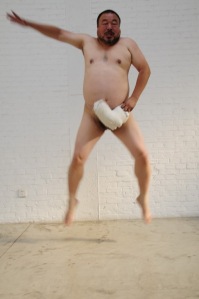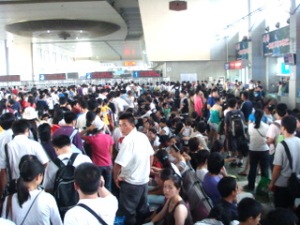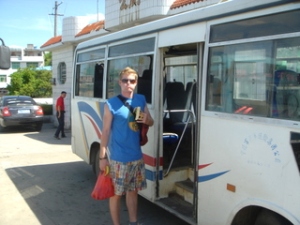Archive for September 2009
Ai Weiwei & China’s Continued Crackdown on Dissent

Ai Weiwei's self-portrait of himself and the "Grass Mud Horse" doll, another popular symbol of dissent in China.
Controverisal Chinese artist and popular blogger Ai Weiwei is recovering from cranial surgery in a Munich hospital bed today.
Ai made modest media rounds in the run-up to the Olympics. The son of famous poet Ai Qing and an internationally reknowned architect, he had been part of the team to design and build the Bird’s Nest. He later went on to boycott the opening ceremony, calling for change in China. In an editorail for The Guardian he wrote,
We must bid farewell to autocracy. Whatever shape it takes, whatever justification it gives, authoritarian government always ends up trampling on equality, denying justice and stealing happiness and laughter from the people.
He became an increasingly prominent critic of the government after the Sichuan earthquake. He took it upon himself to go to Sichuan and find the names of children who had died because of porrly built school buildings, his number turning out to be far greater than that the government reported.
He posted almost 5,000 names on his personal blog (later deleted by authorities), and was determined to bring justice to the area. He traveled to Chengdu, capital of Sichuan province, to testify at the trial of writer and activist Tan Zuoren who was being charged with subversion for speaking critically of the government to foreign journalists.
According to various reports, police came to Ai’s hotel room around 3am. They detained him for 11 hours in order to ensure he would not make the trial. It is also believed they beat him, and that beating may have lead to cranial bleeding, the cause of surgery.
Ai’s story is yet another example of the bravery of Chinese dissidents and the struggle they go through for reform.
In my last post, I wrote of progress and the need to look at the positives in China without always referencing the negative. That does not mean ignore these brutal realities. The struggle for freedom of speech and justice deserves our attention. To recognize signs of progress does as well. Encouraging benevolent, peaceful solutions leads to less repressive violence.
Media Bias: Bogus Balance & American Insecurity
Thomas Friedman’s article on one-party autocracy versus one-party democracy caused quite a stir online. I linked to the story in my last post, noting that I, too, believe China’s–err– unique form of government offers great possibilities.
I say this knowing full well the shortcomings of the system. But as I have discussed at length with many friends across the globe, why is it that American Brand Democracy is the only viable option for governance? If anything, our US government has shown tremendous flaws over the last eight months. How can a president elected with a clear majority lead a Congress in which his party controls a clear majority– all elected by the voice of the people– and still not pass crucial, popularly-supported legislation in a timely manner?
There needs to be alternatives, more than just deciding between a congress or parliament. Countries’ unique social/economic/political/historical variables necessitate complex systems of integration into government. American Brand Democracy exports to South America and Africa have mostly lead to countries mired in poverty, with political elites fattening pockets off of exported natural resources. Is that what were talking about here?
So why is it impossible to write about China’s system making progress without mentioning it’s faults if those faults are not applicable to the story? Must they always be? Do we mention the historical failings of American regime building efforts in every piece of news on Afghanistan and Iraq? Would that not be tedious and redundant?
The Friedman article brought to light an interesting argument in a tongue-in-cheek way: Why does China seem so much more capable of major reform than the US? That’s a question that needs an answer.
Here’s another: Why are Americans so reluctant to offer any iota of praise for China? Is the fear that palpable? Is our identity as Americans jeopardized by the fact that our paralysis is allowing others to stand?
Follow this link to read a very insightful analysis of this banal media bias.
“People’s Daily” Editorialists Just Don’t Get It
I figured I would link a few of the venomous rants China’s main party paper spued out over the last week surrounding the Dalai Lama’s trip to Taiwan. An editorial on the China-Tibet branch of The People’s Daily broached the subject rather subtly, titling the article “Similarities Between Dalai Lama and Typhoon Morakot.” Wow, here’s a line, and this just crossed it.
The editorial goes on to compare the typhoon’s destruction to that of last year’s March 14th Lhasa riots. In a staggering leap of logic, this pen-wielder believes the loss of 376 lives in Taiwan, with 254 missing, balances out to 18 civilian deaths in Lhasa.
I’m not one to measure the value of a life; there is no scale for tragic loss. But to so brazenly– and pathetically– try to draw a parallel here is despicable. Following the logic of the editorial, Morakot and the Dalai Lama are murderers. A stretch, even for the most rabid Dalai-haters.
Comparing what is likely to be the loss of over 650 lives to 18 is a grave injustice to those still living in the aftermath of Morakot. Knowing this, the propagandist tries to solidify his claim, exacerbating this insulting line of logic by adding to the 18 the fact that “242 public security police and armed police soldiers were either injured or killed.” Problem, here. Nowhere and at no point in time did Xinhua report the death of any Chinese soldiers. So the “or killed” part is complete fallacy. It’s a shallow attempt at mustering up some sort of patriotic empathy for injured soldiers– who, I might add, were mostly carrying guns and flak jackets to a stick fight.
The second editorial, “What Could the Dalia Lama Bring Taiwan?”, is another bewildering misinterpretation of humanity. I may not be religious, but I can understand the solace provided by spirituality in times of great suffering. This editorial infers Taiwanese people should be more upset about possible strains on cross-strait economics than the loss of loved ones.
And on top of that, “the move not merely riled the Chinese mainland government, but irritated the general public across the Strait… Some even take the island’s invitation of the Dalai Lama, a political monk lobbying around to split China, as a slur on the Chinese government and people.” Yes, China, this is all about you. It’s all about not upsetting you, all about splitting your country, all about your soldiers’ lives, all about your paper-thin confidence and your two-year-old’s temper.
The editorial ends by stating “the monk [will] bring along… another disaster beyond Nature.”
And Chinese wonder why Taiwanese see their offers of help as political ploys and disingenuous bribery.
Front Burner Topics: Racism in China, etc.
I grew up in New Hampshire. The state’s population is 95.5% white. That’s a lot. More than a lot. It’s why I once had a friend (who I actually do not consider racist) unintentionally mutter a quick “wow,” when he saw a black guy walking down Main Street in my hometown. Yeah, it’s like that.
It’s also strikingly similar to China’s ethnic mix: 91.5% Han Chinese. Whether people approve or not, living in such a huge majority bends the yardstick for socially acceptable behavior. China (and Taiwan) are grossly racist.

"Oreintal Angel" Lou Jing is definitely Blasian!
Part of it is cultural. There is, especially for young woman, a desire to have deathly pale skin. This is meant to prove your wealth, perhaps tacked to old notions of parlor living and powdered English wigs. For as much as the Chinese hate “Western interference” they love to chase its ideals. Pale is pure, and dark means dirty. It means field workers, farmers. And to the elite– then and now– the backbone of society, the working class, those that feed China, is a cast(e) of untrustworthy thieves.
For as odd to the eye as a white person is in remote parts of China, it fails to surpass the contrast in appearance of a dark skinned black person. And Chinese equate fear with this. It’s the age old DIFFERENT=DANGEROUS equation.
It’s no surprise that Lou Jing– a gorgeous Blasian young woman who worked her way onto a popular TV show– was targeted by the narrow-minded netizenry of China’s uber-lame mainstream Web forums. If you want to know how far China has to go before becoming a “harmonious society,” read this disturbing translation from chinaSMACK.

Chinglish makes everything a bit more interesting!
Here are a couple other quick links:
- China, ever-so romantic, has dropped a ban on it’s national ping-pong champ. At age 25, he is now allowed to have a girlfriend.
- “Long time no see,” for those who don’t know, is a literal translation of a common Mandarin saying. Direct translations can turn out to be quite humorous, and eventually acceptable. But in Shanghai, the city gov is working to eliminate any instance of jumbled English phrasing before the open of the World Expo (a.k.a. World’s Fair) next year. Here’s an article on “chinglish,” the hybrid of our two tongues. The Flickr chinglish group it mentions can be found here. Some shots are downright hysterical.
- And here’s a bizarre article about a troublesome bridge in China and a savory solution to suicide threats.
The Panic of Passenger Travel at Chinese Airports
Tickle-me Elmo. I get it.
Only so many in stock, and you just have to have that perfect present for little baby Bob. It makes sense. To some degree, it makes sense.
If there is some sort of caveat– while supplies last, first ten free– then I can understand a heightened level of urgency. When you pour that cocktail into the collective bloodstream of a large group, somebody take their keys.
Nowhere is this chaos more coded into the DNA of derailed human beings than a Chinese airport. It’s groupthink gone terrible awry– a bastardization of acceptable public behavior. And I’ve lived to tell it.

The situation is even worse in train stations. Pictured here, the waiting hall for a train from Chengdu to Chongqing.
Chinese airports are, on appearance, most like any other countries’. They are often a good distance outside of the city. They have the departure and arrival levels, lines of counters, display boards. It’s all there.
But the madness– the hair-pulling, eye-gouging mayhem– arrives with the passengers. While people abroad laughed at Beijing’s “Line-up Day,” those of us here on the ground applauded the effort. Lining up, a line. Seems so simple. Logical, rational. Easier for everyone right?
Wrong.
It starts at the check-in counter. The man behind me is standing so close that the hair on the back of my neck is practically in his mouth. Garlic for lunch, that’s usually a given. Something garlicky, or rotten, like a decade lacking a toothbrush, or stale cigarettes. Another favorite. Maybe all three, all there, and now, clouding around me. The guy doesn’t want to lose an inch, doesn’t want to provide an opening where some daring derelict might slice in and steal a spot in our line. This is tooth-and-nail territory.
I step forward, he steps forward. Step, step. Step. Slam, slam. His bag whacks the back of my knee. Something pointy. What does he have in there? Ice-skates? Hard-covers?
Bogey ahead! Old woman just torpedoed out of nowhere, ignored the entire line as if we are standing here on our own accord, a conga line with no music. Right to the front she goes.
Now, we suckers in line have a 50% chance of a positive outcome. The attendant will either repel her sneak attack, telling her to head to the back, and point politely to our line. The old woman will then turn and don a fantastic “Oh-my-gosh-I-didn’t-even-notice-how-silly-of-me” face. Or, perhaps because of her old age or the sheer volume of how loud she is raving or how difficult it is to get her to stop talking in her city dialect, the attendant will fold, allowing her to cut.
Okay, boarding pass in hand and through security, the next real test is the gate. You might look at the lounge and think to yourself, “Seems normal. People reading, listening to ipods, sleeping.” Don’t let them fool you.

No such problem boarding this bus to the middle of nowhere in Fujian-- just a hangover and a funky smell.
They’re all in a very well-practiced Usian Bolt-esque sprinters squat. In the millisecond between the airline attendant turning the mic on and actually announcing, “Flight XXX to YYY is now…”– in that millisecond of static and inhaling breath– bang! 147 people in “line.”
There are 150 seats on the flight. Taking myself into account, two people must be late. It’s a amorphous blob, not a line. It’s eight people wide, and lumpy. People lurk in the middle. Architectural columns become terrain for flanking maneuvers. Carry-on becomes a tool, wedging, prying, and pushing. It’s grandmothers, it’s little kids. Anything goes.
And the airlines, oh yes, they know; they’re co-conspirators! Never once have I heard a Chinese airline board a plane by row, starting from front to back. This, this lack of order, ensures once we all board, as people literally sprint down the jet way, we will all bottleneck in the aisle, which, of course, begets more pushing. More grunting. More unnecessary contact and anger.
We all have assigned seats. We’ve booked the tickets. We’re not leaving until everyone checked-in is on board. And still.
Second to last time I was on a transport bus taking us to an awaiting plane on the tarmac. There were two doors– front and back– on each side of the bus. People had spent the last 5 minutes gnashing and prodding, climbing over each other to finally establish their ideal position. With everyone else. Going to the same plane. Together. But this time, the front bus door didn’t open. Oh, shit!
A pair of middle-aged men absolutely frickin’ lost their minds. First, the bus driver got it– berating, cussing, spitting. How in the hell could he not open the front door! They started punching the door, punching the glass. One guy actually started kicking it, hard, and high. This wasn’t like a tap along the baseboards. This was a full-fledged, 90-degree, flat of the foot kick to the glass on the bus door. So hard, he stumbled backwards a few steps to regain his balance.
Then, we all boarded the plane and sat there for ten minutes in our assigned seats before taking off.
William H. Whyte, Jr., the man who coined the term “groupthink” in a 1952 Fortune article, called it “rationalized conformity.” The definition was amended later, to include the notion of “not causing conflict among peers.” Well, the wheels on the Rational-No-Conflict cart have come way off.
You could bend the definition a bit. Let’s assume people make the rational decision to allow this type of behavior by others in order to avoid confrontation with these maverick hooligans. That’s actually very Chinese. “I am only one person in a billion,” they like to say.
Merriam-Webster’s calls groupthink “a pattern of thought characterized by self-deception, forced manufacture of consent, and conformity to group values and ethics.” Do I conform?
Hell yes I do.
Most of the time I am content to wait and be the last to board. I put on a snooty look of belittling condemnation. I frown and shake my head at people, like an elementary school teacher when a kid drops a can of paint in art class.
But sometimes I lose my cool. I enter the line a bit too early and someone behind me Tonya Hardings my knee. I’m a nice guy, so I let it slide. Then, Same Person flat-tires me. I turn, make a sort of half-loco growling face meant to intimidate, and find it is some mother holding a child. For a second, I relent. Then the baby reaches out and violently rip-chords an earphone out of my ear. Mother says nothing to Child, but watches, not even amused, just emotionless, focused on pushing her way to the front.
She’s off the list.
There is no f-ing way she is getting in front of me.
The most peculiar part of the experience is upon actual arrival. As the plane screeches and skips to a halt on the runway, before the roar of the jets even subsides, you can hear a massive exodus of belts from buckles– like a hand piano-jamming it’s way across an old IBM keyboard. Click-click-click! They’re ready to roll.
The plane slows, not stops, just slows. Some brave soul leaps to her feet, pops open the overhead and grabs her bags in one fluid motion, a blink of an eye. Blink. Blink. The entire aisle is full of people. The plane is still moving, turning, people lose their balance, stumble, fall and lean on each other. The speaker comes on and the flight attendant asks for people to remain seated. Yeah right.
Now we’re stopped, and everyone is standing on each others’ toes in the aisle. The door always seems to take forever to open. Forever, probably, seems that way, because everyone has been standing in the aisle for so damn long. Finally, we all deplane.
As we hit the jet way and turn to head down the arrival hall, a bizarre metamorphosis occurs. The Chinese passengers revert to their normal, in-city, super-slow-walking selves. For all the huff and puff, the shoving and sneering, now, actually arriving, it’s all for naught. It seems no one really cares about arriving any faster. Sure, you have a few strong-armers who hustle to the baggage claim, to, again, wait.
But after all that, after I flattened that mother and her child, had some strange man rub his crotch on me as he squeezed past in the aisle, had to sit in the sweaty stench filled cabin full of these intrepid plane-boarders– after all of that, no one wants to rush to their final destination?
Then get the F out of my way. I do.
Quick Hits
Proof of creative, rebellious minds at work here in China.
Another example of hypocrisy: the BBC’s shock at China’s effort to build national pride before the nation’s 60th anniversary. Do we in America not do this every year around Thanksgiving and Christmas? I mean, duh.






